#constitutional originalism
Text
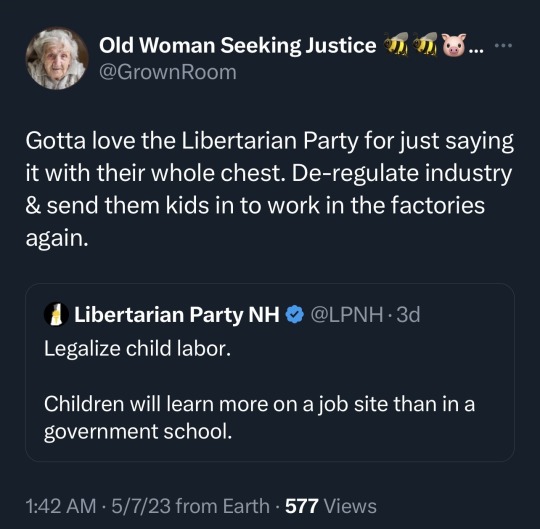
#child labor#child abuse#child development#children#traditional moral values#libertarian#republican#constitutional originalism#classical liberal#conservative#fuck capitalism#capitalism#social issues#anti capitalism#late stage capitalism#current events#corporations
250 notes
·
View notes
Text
Did you know that the US Constitution does not give citizens the right to vote? There is no affirmative right to vote in the original document, only a requirement that the states define it. Amendments forbade discrimination based on gender and race relatively recently, but deciding who can vote has been a contentious issue since the country was founded. From the start (for the most part) only property-owning white men had the privilege, but even that varied by state and location, and few founders believed that universal suffrage was desirable or even possible in a democracy.
Teri Kanefield has written a great summary of the practice— link and except are below. This has been a contentious issue from the beginning. Just because you have the privilege today, don’t expect that people in power want you to keep it.
A government “of the people, by the people, and for the people” raises a question: Who is included? Who are the people? It is obvious that if you can’t vote, you are not one of the “people” in “We the People.”
If you zoom out and take a look at the history of voting rights from 30,000 feet, you see this:
In the colonies and early America, the right to vote was restricted to white men who owned property. (Some colonies imposed other restrictions.)
“Jacksonian Democracy,” the era of President Andrew Jackson, expanded the franchise to all white men. The Jacksonian idea was that a poor barely literate white man on the frontier should have the same voice as a well-educated easterner. (Jackson—an unrepentant enslaver, a slaughterer of Native people, and a fan of white men on the frontier—despised East Coast “elites.” As a practical matter, those elite Easterners generally didn’t approve of taking land from Native people, whereas those white guys on the frontier were fine with raiding and plundering lands belonging to Native people, so Jackson wanted their votes.)
After the Civil War, the vote was extended to Black men in theory. In practice, voter suppression tactics and terror tactics kept most Black men from the ballot box.
The 19th Amendment added all women, in theory. In practice, it added white women.
The Civil Rights and Voting Rights Acts of the 1960s attempted to expand the right to vote to all Americans by enforcing the 14th and 15th Amendments. The 26th Amendment lowered the voting age to 18.
The current Supreme Court majority is not a fan of these voting rights acts and has sought to cut them back on the grounds that the Constitution does not contain an affirmative right to vote.
Until you get to that last part, you might think that “the history of voting in the United States has been characterized by “a smooth and inexorable progress toward universal political participation” until Justice Roberts and the current Supreme Court majority. Nope. This is from the Oxford Companion to American Law:
The history of voting rights has instead been much messier, littered with periods of both expansion and retraction of the franchise with respect to many groups of potential voters.”
51 notes
·
View notes
Text
The Conservative Supreme Court Vision That Means Inequality for Women
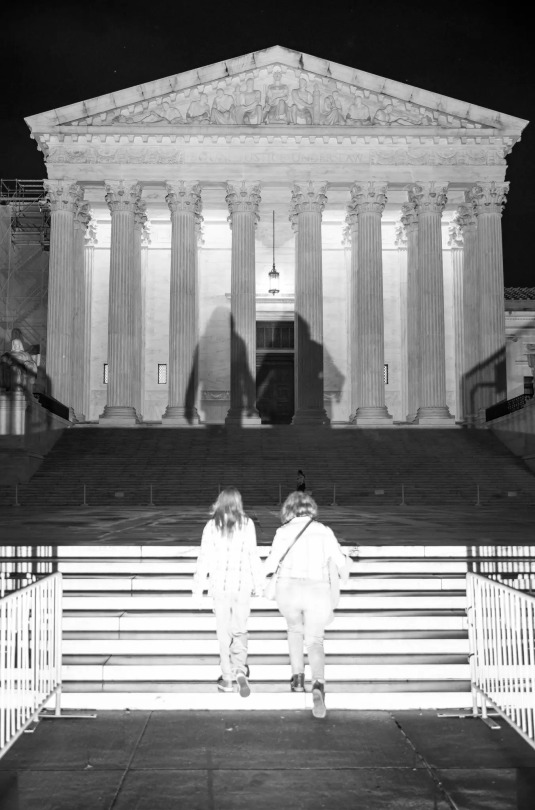
“I'm trying to understand if there’s a flaw in the history and traditions kind of framework to the extent that when we're looking at history and tradition, we're not considering the history and tradition of all of the people but only some of the people, as per the government's articulation of the test?”
--Justice Ketanji Brown Jackson, regarding United States v. Rahimi

This is a gift🎁link that anyone can use to get past the NY Times paywall to read this entire column about how the championing of "a history-and-tradition-bound method of constitutional interpretation" by the conservative SCOTUS justices will most likely limit women's rights. As the authors Melissa Murray and Kate Shaw point out, at the time the Constitution was written, "the principle of 'coverture' [that] gave husbands legal authority over their wives" was part of common law. So (perhaps by design) an originalist constitutional interpretation will result in second-class status for women.
The requirement that present-day gun laws resemble gun laws of the distant past prioritizes history and tradition in much the same way the Dobbs court looked to the historic regulation of abortion, pregnancy and birth to support the view that the Constitution did not protect a right to abortion.
[...]
The history-and-tradition methodology privileges laws enacted in eras like the 1780s, when the original Constitution was ratified, and the 1860s, when the 14th Amendment was drafted and ratified — moments in time when neither women nor people of color were able to fully join the political community and played no official role in enacting laws.
Should a method that privileges eras of extreme democratic deficit be relied upon to determine contemporary constitutional meaning?
[...]
As an amicus brief...explains, in common law, the principle of “coverture” gave husbands legal authority over their wives, including the prerogative to “correct” or “chastise” through force or violence. There is active debate regarding how domestic violence was perceived in the 18th and 19th centuries. But arguing on these terms still embraces a fundamentally antidemocratic principle — that history alone, at whatever level of generality, can determine whether contemporary laws are constitutional.
Although the history of domestic violence enforcement was extensively discussed and debated in the briefs, it was only glancingly referred to in oral argument. This too is notable. If the terms of the debate are history and tradition, whose history and traditions will get priority?
[color emphasis added]
#scotus#constitutional originalism#us v rahimi#women's rights#coverture#historical legal tradition#inequality#domestic violence#gun laws#melissa murray#kate shaw#the new york times#gift link
81 notes
·
View notes
Text
“Last year, the Supreme Court, in an originalist opinion by Justice Clarence Thomas, held that the Second Amendment precludes virtually any gun control limitations that were not widely employed historically.
Thomas argued that if our nation doesn't already have a long and demonstrable historical tradition of limiting access to firearms in a particular way, then the government is not permitted to enact such a limitation today.
But of course, the vast majority of modern gun control laws don't have clear historical analogues. We didn't face the same concerns back then. Guns were much less sophisticated and much less deadly, and our society was very different. Of course, we didn't enact laws way back then to address today's unique concerns.
A few months ago, relying on that originalist decision of the Supreme Court, the Fifth Circuit Court of Appeals struck down the federal law prohibiting persons under a restraining order for domestic violence or domestic abuse from owning a gun.
At the time of the framing, domestic abuse was not a crime.
A husband had a legal right to assault or even to rape his wife. Thus, historically, there obviously were no laws preventing domestic abusers from owning a gun.
Therefore, under the Supreme Court's originalist rule, such a law is unconstitutional today. And thus, the Fifth Circuit struck the federal law down.
But of course, historically, women were considered to have virtually no rights at all. And women had no ability to vote, no ability to hold public office, no ability to participate in the political process by which the historical laws determining the scope of permissible gun regulation were made.
In that bygone era, the laws way back then were made by the men doing the beating, not by the women being abused.
And yet, originalism tells us that the fact that the exclusionary, unjust political process of a long gone age did not protect domestic abuse victims means that all federal, state and local governments everywhere today are powerless to protect those women.
Every single day in America in 2023, multiple women are shot and killed by domestic partners, and the government can do nothing to keep them safe, because 200 years ago, the men in power didn't think that domestic abuse was a problem.
That's no way to decide constitutional law cases in the 21st century.
It's just not.”
—Prof. Thomas Colby, NO, the Supreme Court should not focus on the ‘originalist’ meaning of the Constitution
#politics#scotus#guns#republicans#domestic violence#thomas colby#originalism#dv#constitutional originalism#conservatism#white supremacy#domestic abuse#intimate partner violence#intimate partner abuse#the constitution#us constitution#gun control#2a#gun culture#2nd amendment
38 notes
·
View notes
Photo
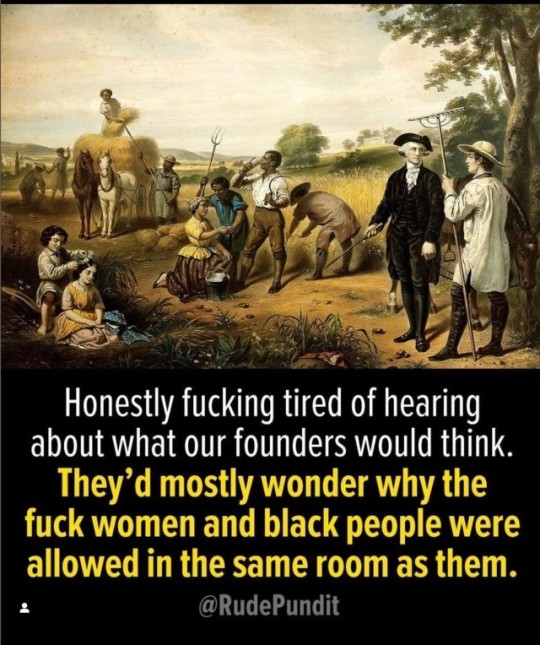
RACISM, MISOGYNY AND PATRIARCHY...CONSTITUTIONAL ORIGINALISM.
5 notes
·
View notes
Photo

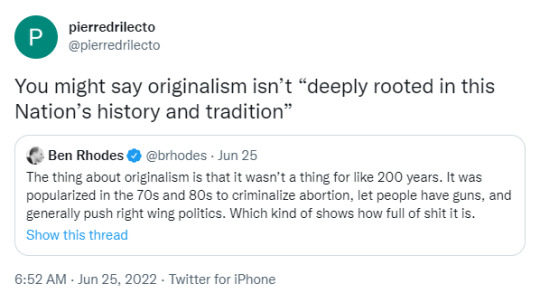
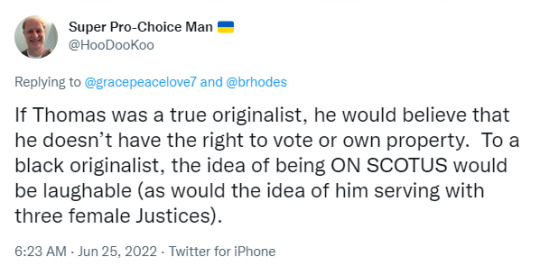
#american politics#US constitution#scotus#constitutional originalism#clarence thomas#reform the court
9 notes
·
View notes
Text
As an adjective the word original can mean something that is not dependent on other people’s ideas; however, the illogical philosophy of constitutional originalism is wholly dependent on some people’s idea that freedoms and responsibilities can only be legally granted/altered through the amendment process.
UC Berkeley School of Law dean Erwin Chemerinsky explains the dangers of a United States Supreme Court whose majority assumes justice in a modern and dynamic society can only be interpreted through their narrow interpretation of history.
“The implications of a court committed to originalism are frightening. In overruling Roe, the conservative justices said that a right should be protected only if it is in the text of the Constitution or safeguarded by a long unbroken tradition.
Adhering to this doctrine would put in jeopardy the right to marry, the right to procreate, the right to custody of one’s children, the right to keep the family together, the right of parents to control the upbringing of their children, the right to purchase and use contraceptives, the right of consenting adults to engage in private consensual sexual activity, and the right of competent adults to refuse medical care.”
#Los Angeles Times op-ed#inequality#scotus#justice#Erwin Chemerinsky#legal doctrine#constitutional originalism#roe vs. wade#conservatism#reproductive health#women’s autonomy#american health system
0 notes
Text


The Bow of the USS Constitution. “One of the only” parts of the Ship to retain wood from its initial build 1794-1797
Photos by Jimmy J, 2024
666 notes
·
View notes
Photo


days by the seaside
#sometimes u travel out to a hut by the ocean for your constitution and to look at creepy + wet larval fish#original#original art#cato art
3K notes
·
View notes
Text

The U.S.S. Enterprise making a bee line away from a familiar looking planet.
#Star Trek#Star Trek: The Original Series#U.S.S. Enterprise#NCC-1701#Constitution-class#Starfleet#Starfleet starships#starships
75 notes
·
View notes
Text
Buddie confession scene but it’s just Buck telling Eddie how “Whatta Man” started playing in his head the day they met and Eddie was shirtless
#take this so seriously guys#really#buddie#buddie confession#evan buckley#Eddie diaz#i just want to see#just bc i think Eddie would blush SO hard#9 1 1 abc#911 abc#you can’t tell me that scene isn’t from Buck’s perspective#he’s literally the focus of the scene bc of the jealousy#like PLEASE#specifically I’m imagining this love confession happening and then somebody spills the beans at their wedding reception#that THIS was the love confession#one of the comfort quartet idk which but Maddie hen chim karen you WOULD#this could also constitute a scene where the boys are SO FAR into gay chicken that it doesn’t even originally play as a love confession idk
65 notes
·
View notes
Text
On Originalism.
Imagine for a moment being a delegate to the Constitutional Convention in 1787, and returning home to sell it to your state legislators. Would a delegate from New Hampshire or Massachusetts make the same pitch as one from South Carolina or Georgia? Clearly not, because the US Constitution was a massive compromise of competing interests. In order to pass it, every legislature had to look at it as beneficial to them.
We think state cultures are different now, but they’re practically identical compared to what they were in the 18th century. The colonies had completely different economies, industries, and even religious traditions. Colonists remote from each other could hardly understand each others’ speech during the Revolution, much more so than today.
The states have homogenized over time, especially during the last century. Some pretend we have irreconcilable differences, but the fact is that we’ve never been more alike than today. Even politically, some states’ fixed one-party rule is only held by a couple percent.
There is simply no way that any controversial provision of the US Constitution had one “Original” meaning. To suggest they did is either a lie or a willfully ignorant take on how politics and a legal system work.
We can go back and look at the historical debates around each phrase or issue, to better understand the time in which it was written, but that isn’t originalism, and it doesn’t (and it can’t) take us to the true intent of everyone who wrote & ratified the Constitution.
This is why the Constitution is properly considered a living document. It’s a framework for our government to operate within as appropriate to the time, not a rigid cultural rulebook that tells us how to dress or who to worship.
To divine an “original” meaning for every part of the US Constitution will be to actively choose which state’s (indeed, which individual state legislator’s) viewpoint will be followed.
Originalism is a farce, one that makes a mockery of the Constitution and of over two centuries of change and precedent. It says “I alone know the hearts of the founders,” of course, but it also says, “I alone know which founder’s heart to follow.”
That’s simply ludicrous.
It turns Supreme Court rulings into a multiple choice exam, where not only does the class provide the choices, but each student then picks the “correct” answer based on whichever texts they prefer. It is a ready formula designed to be gamed by its users.
Originalism (and by extension this Supreme Court) is a joke.
47 notes
·
View notes
Text

Artwork of USS Enterprise NCC-1701 with USS ENTERPRISE (CVN-65).
Artwork by Shrox.
source
#USS ENTERPRISE (CVN-65)#USS ENTERPRISE#Enterprise Class#Aircraft Carrier#Warship#Ship#USS Enterprise NCC-1701#USS Enterprise#Constitution Class#Star Ship#Heavy Cruiser#Cruiser#Star Trek#Star Trek the Original Series#Star Trek TOS#TOS#artwork#my post
98 notes
·
View notes
Text
Democracy is when Bernie wins and fake democracy is when anyone else wins, am I an expert in political sciences.
#I was originally going to make this vague but Bernie simps are STILL trying it#he lost the primaries… TWICE#because more people voted for the other guy/girl/gay#democracy is democracy even when your guy loses as long as the elections are free and fair#(this is why the electoral college is stupid btw)#it’s not fair that Wyoming voters have 3 times the voting strength towards electors as a California voter#and the system should be abolished#but because it categorically advantages one party that party will never agree to the number of votes required to amend the constitution
113 notes
·
View notes
Text
#if ppl start debating abt what constitutes a vowel i stg#this has been an original post#my pollies#polls#vowel poll#anyway the answer is o
470 notes
·
View notes
Text
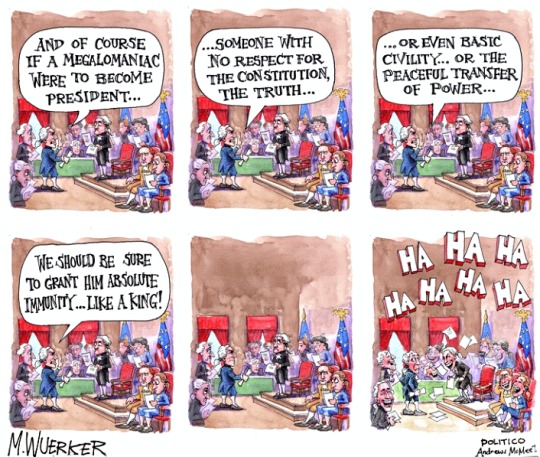
The attendees of the Constitutional Convention were clearly against absolute rulers. There is nothing about immunity for presidents or other officials. The only time any form of the word immunity is mentioned is in Article IV Section 2 where it is used in relation to extradition.
The Trump-Bush "originalists" on the US Supreme Court have gone from following the original language of the Constitution to coming up with their own very original ideas on how to decide cases.
Here is the reality that we're living with today:
As long as Donald Trump is the standard-bearer for the Republicans, every institution they control will contort itself in his image in an effort to protect him.
– Adam Serwer at The Atlantic (archived)
Trump needs to be defeated at the polls in November. And the only way to defeat him is to vote for Joe Biden. "Protest votes" for impotent third-party candidates who have no chance of winning are as useful as used toilet paper.
Don't rely on the current Supreme Court, some hypothetical sequence of convoluted actions, or some unlikely deus ex machina thunderbolt to rescue us. Nobody will save us from us but us.
We need to get out of our comfort zones and push the envelope around people we know. That doesn't mean getting into time wasting arguments with MAGA cultists; it does mean challenging Trump-curious comments from low information voters. Seeds of doubt planted now can germinate later this year.
People who feel nostalgic about the Trump years should be reminded that those included 2020 which saw the US with the worst COVID-19 response of any industrialized country. There's also Trump's attempted January 6th coup, his surrender to the Taliban, and the enormous tax breaks for the filthy rich.
I Will Vote
#us supreme court#scotus#originalism#us constitution#us constitutional convention#immunity#donald trump#adam serwer#register and vote#election 2024#vote blue no matter who#matt wuerker
41 notes
·
View notes